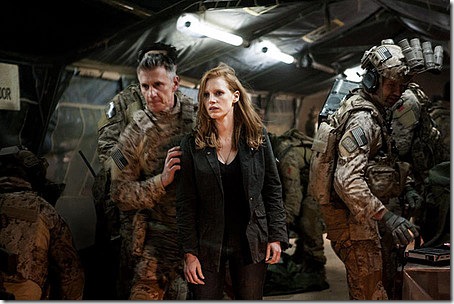Hollywood’s view on the U.S. intelligence organizations’ “enhanced interrogation techniques” that have been violating Geneva conventions since 9-11 is pretty clear. Rendition, Taxi to the Dark Side, Standard Operating Procedure — these features and documentaries all take the correct liberal position on the issue: that torture is shameful and ineffective, a moral blight on this country.
Ever the rebel, Kathryn Bigelow’s Zero Dark Thirty, a pugnacious procedural about the hunt for Osama bin Laden, bucks this trend, showing us a detainee, named Ammar (Reda Kateb) chained like an animal, smacked around, waterboarded, compressed into a box and deprived of sleep at a CIA black site. His pants are stripped off, revealing fecal matter around his buttocks. It’s horrifying to watch. Fair-haired and fair-skinned CIA operative Maya (Jessica Chastain), newly exposed to the techniques at the beginning of the film, is visibly uncomfortable with the proceedings.
But, apparently, they worked. Combined with the strategic gifts of food and drink, the threat of future torture leads Ammar to relinquish the name Abu Ahmed, which, as followers of the bin Laden manhunt will recall, was the nom de plume of the courier who would eventually lead the United States government to bin Laden’s Abbottabad compound.
So much for the theory that torture doesn’t work.
As a passionate advocate against torture practices, I’ve long considered FBI interrogator Ali Soufan to be an inspiration. Outspoken against torture, his tools included offering detainees tea and debating with them in his Arabic tongue – in other words, viewing them as humans, not monsters, with world views demanding respect and attention. Senate testimony from Soufan in 2009 revealed that he received a flow of actionable intelligence from Abu Zubaydah — a flow which abruptly stopped when other officials began to waterboard the suspect.
The fact is, these facts can be true, and so can the fact — confirmed time and again in ideologically neutral media outlets following the bin Laden takedown — that torture led to the al-Qaeda leader’s discovery. This thorny debate is not black and white, and the presentation of the facts as reported to Bigelow and screenwriter Mark Boal do not make them pro-torture spokespeople, so let’s nip that theory in the bud right away. What’s important is that the film has reignited this debate, period, forcing our short attention spans to be diverted, at least for a modicum of time, on torture and its implications for the world at large.
But it’s also a shame that this controversy has consumed the film to the extent that the rest of this exciting, hyper-realistic example of “War on Terror” reportage has been glossed over. Shot in multiple countries and taking place over a nine-year period, this ambitious docudrama is further proof that sensationalism and sentimentality have no place in art. Bigelow never succumbs to them, preferring a just-the-facts approach rife with insider alphabet-agency chat sessions and undercover operations in secret black sites and bustling Pakistani streets, occasionally punctuated by sobering terrorist attacks. It may be the briskest 157 minutes you’ll see this year.
The manhunt is filtered through the mind, body and spirit of one woman, Chastain’s Maya, who transforms before our eyes into a waifish intelligence ingénue to an impossibly dedicated force of nature who throws around “motherfuckers” to Leon Panetta like she’s Samuel L. Jackson.
Maya is like Bigelow herself, a woman operating in a man’s world, outshining the testosterone-fueled brass surrounding her. Obsessively motivated to track bin Laden long after her superiors have given up (remember President Bush’s quote, not presented in the film, that he’s “truly not concerned” about bin Laden?), she assumes the role of the dedicated cop in relentless pursuit of the serial killer, eschewing everything else in her life. It’s a familiar archetype, but one I’ve never seen played by a woman. What is particularly unfortunate about the torture quagmire is that the film’s fundamental feminism is hardly discussed. Zero Dark Thirty is an inspirational picture of a proud female heroine, harking back to the days of Johnny Guitar and Forty Guns.
Maya’s quest is far from a satisfactory one, even considering the final result. The end may justify the means, but the means can be heartbreaking. Maya frequently cheats death throughout the picture — a narrative filled with mounting setbacks, frustrations and sheer destruction, mitigated by the occasional iota of usable intelligence. The stress of the job is revealed on Chastain’s countenance in this extraordinary performance; she gradually looks more and more peaked, her drive overcoming a body that would just as soon break down.
The devastation also affects those around her, of course. About halfway through the movie, a colleague of Maya’s, whom we have come to admire, perishes in a suicide bombing triggered by a false lead. This person became one of several CIA agents who died on assignment that day. What is so powerful about this scene, and the film in general, it’s that it puts human faces on statistics that, like this one, were reported for all of 10 seconds by American media outlets, in between celebrity rehab news and the political sex scandal du jour.
Intelligence officers and congressmen complaining about the film’s depiction of torture need to get off their misplaced moral high horses and think about that for a while.
ZERO DARK THIRTY. Director: Kathryn Bigelow; Cast: Jessica Chastain, Jason Clarke, Kyle Chandler, Jennifer Ehle, Reda Kateb, Mark Duplass, James Gandolfini, Stephen Dillane, Joel Edgerton, Chris Pratt; Distributor: Sony Pictures; Opens: Now playing at Cinemark Palace 20; opens Jan. 11 at most area theaters
